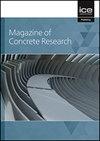三维可打印混凝土的搅拌方法:添加方法和优化超塑化剂用量
IF 1.8
4区 工程技术
Q3 CONSTRUCTION & BUILDING TECHNOLOGY
引用次数: 0
摘要
本研究系统地探讨了在搅拌三维可打印混凝土(3DPC)时,超塑化剂(SP)的添加方法以及不同水粘合剂(w/b)比例下的最佳添加量。本研究采用了五种不同的策略来确定最佳添加方法(MoA)。第一种策略采用随机混合法,通过目视观察确定不同时间模式的 SP 添加方法。其次,采用随机混合法中的恒定时间模式,确定最佳的 SP 添加量。第三种方法研究了不同的添加方法和最佳的 SP 添加量。在第四种策略中,评估了最佳 SP 用量下材料的配料效果,最后将不同 w/b 比率和 SP 用量下的可印刷区域进行了关联。观察结果表明,在 0.21 至 0.25 的水胶比和 0.10 至 0.21% 的粘合剂用量范围内,通过在恒定的湿混合时间内全量添加 SP,可获得足够的印刷适性参数。不过,在使用最佳 SP 用量后,还需要在适当的时间间隔内补充 SP 用量,以保持较高批次的可加工性。本文章由计算机程序翻译,如有差异,请以英文原文为准。
Mixing approach for 3D printable concrete: method of addition and optimization of superplasticizer dosage
This study systematically investigates the superplasticizer (SP) addition methods and optimum SP dosage with various water binder (w/b) ratios for mixing 3D printable concrete (3DPC). In the present study, five distinct strategies were adopted to arrive at the optimum Method of Addition (MoA). The first strategy applied the random mixing approach to identify the methods for adding SP with varying time patterns through visual observation. Secondly, a constant time pattern was adopted from the random approach for mixing and the optimal SP dosage was determined. The third strategy examined different addition methods with the optimum SP dosage. In the fourth strategy, the batching effect of the material with the optimum SP dosage was assessed, and finally, the printable region with different w/b ratios and SP dosages were correlated. The observations illustrated that the optimum SP dosage in the range of 0.10 to 0.21% of binder with a w/b ratio of 0.21 to 0.25 achieved adequate printability parameters by full addition of SP following a constant wet mixing time as the optimal application. However, after applying the optimum SP dosage, a supplemental SP dosage is required at appropriate intervals to retain the workability for higher batches.
求助全文
通过发布文献求助,成功后即可免费获取论文全文。
去求助
来源期刊

Magazine of Concrete Research
工程技术-材料科学:综合
CiteScore
4.60
自引率
11.10%
发文量
102
审稿时长
5 months
期刊介绍:
For concrete and other cementitious derivatives to be developed further, we need to understand the use of alternative hydraulically active materials used in combination with plain Portland Cement, sustainability and durability issues. Both fundamental and best practice issues need to be addressed.
Magazine of Concrete Research covers every aspect of concrete manufacture and behaviour from performance and evaluation of constituent materials to mix design, testing, durability, structural analysis and composite construction.
 求助内容:
求助内容: 应助结果提醒方式:
应助结果提醒方式:


